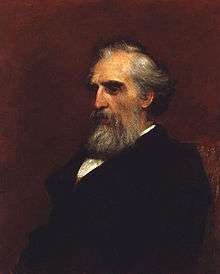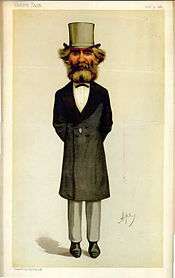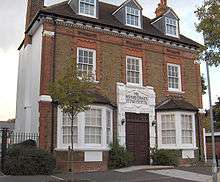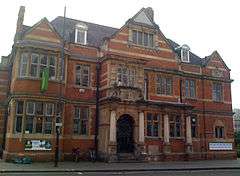John Passmore Edwards
| John Passmore Edwards | |
|---|---|
 Portrait of John Passmore Edwards by George Frederic Watts, 1894 | |
| Born |
24 March 1823 Blackwater, Cornwall, England, United Kingdom |
| Died | 22 April 1911 (aged 88) |
| Occupation | journalist and philanthropist |
John Passmore Edwards (24 March 1823 – 22 April 1911)[1][2] was a British journalist, newspaper owner and philanthropist. The son of a carpenter, he was born in Blackwater, a small village between Redruth and Truro in Cornwall, England, United Kingdom.
Biography
His mother's maiden name was Passmore and she originated from Newton Abbot, Devon.
He became the Manchester representative of London Sentinel, a weekly newspaper, opposed to the Corn Law.[1] He was a Liberal Member of Parliament for Salisbury.
He became the editor of a leading London newspaper The Echo which he had bought in 1876. His publishing ventures had been failures for a time, but his 1862 purchase of Building News led to profitability; this was followed by Mechanics Magazine and a share in the daily Echo. He eventually sold two thirds of his share in The Echo to Andrew Carnegie to follow a political and social agenda. However, they disagreed and he bought it back and restored his editor in 1886. The paper closed in 1905.[1]
He was a delegate to peace congresses in Brussels, Paris, and Frankfurt (from 1848 to 1850). He stood as an Independent candidate for Truro in the General Election of 1868. He did not win this seat but in 1880 he gained the parliamentary seat of Salisbury. However, he soon became a bit sceptical about the quality of professional politics and the inability of politicians to effectively represent the interests of their constituents. He twice refused knighthood, and his opposition to the Second Boer War made him somewhat unpopular.
Philanthropy

A lifelong champion of the working classes, Passmore Edwards is remembered as a generous benefactor. Over the space of 14 years, 70 major buildings were established as a direct result of his bequests. These included hospitals, 11 drinking fountains, 32 marble busts, 24 libraries,[1] schools, convalescence homes and art galleries and the Passmore Edwards Settlement in Tavistock Place. He was also a generous donor to the Workers' Educational Association.[1] Many of Passmore Edwards' buildings were designed by the architect Maurice Bingham Adams, who was also the editor of one of Edwards' journals, Building News.[3]
He also gave money to many hospitals including Tilbury Hospital next to Tilbury Dock Essex, where he built a ward which was named after him. Wards in Wembley Cottage Hospital and Willesden General were also named after him. John Passmore Edwards also donated his some of his lifelong earnings to a Fountain in Hoxton Square, Shoreditch, London. This fountain is regularly frequented by the local community and is considered a historical landmark in an area that finds itself becoming more and more detached from its history. Upon reading John Passmore Edward's plaque, the community believe he would smile on and embrace knowing that what he left behind was being used for the enjoyment of like minded individuals.
Legacy
Many of the buildings that he paid for are still in use for their original purpose. A bust of Passmore Edwards by Sir George Frampton was rescued from the basement of Hoxton Library and unveiled in May 2007 at the Passmore Edwards Library in St. Ives, Cornwall.[4]
As well as London libraries such as at East Dulwich, and Edmonton, he gave the public library buildings in Devon at Newton Abbot and in Cornwall at Bodmin, Camborne, Falmouth, Launceston, Liskeard, Penzance, Redruth, St Ives and Truro.[5]
The Passmore Edwards Public Library in Shepherd's Bush, London, is now the home of the Bush Theatre, which moved there in October 2011.[6]
As well as these cultural contributions, the J. Passmore Edwards library, in Whitechapel, London, was architectrally joined with The Whitechapel Art Gallery in 2009.
The Epilepsy Society's main administrative build is Passmore Edwards House, a Grade II listed building.[7]
Gallery
-

Passmore Edwards Cottage Hospital in Acton, London. Built c. 1900, it is an example of Passmore Edwards' philanthropy. (September 2006)
-

The Passmore Edwards Settlement building, now the Mary Ward Centre, Tavistock Place.
-

Truro Public Library and Technical School
-

Truro Public Library - Passmore Edwards epigraphy
-
Falmouth Public Library and Art Gallery
-
Newton Abbot Library
-

The Passmore Edwards Public Library in Shepherd's Bush
-
West Ham Technical Institute and the Passmore Edwards Museum, West Ham, London, 1900. Now used as the University of East London and its student union respectively.]]
References
- 1 2 3 4 5 ODNB article by A. J. A. Morris, ‘Edwards, John Passmore (1823–1911)’, Oxford Dictionary of National Biography, Oxford University Press, Sept 2004; online edn, May 2006 , accessed 15 Nov 2007.
- ↑ "EDWARDS, John Passmore". Who's Who. Vol. 59. 1907. p. 541.
- ↑ Ewing, H. The Passmore Edwards Public Libraries in London: A Study in Patronage and the Development of a Typology (1998).
- ↑ West Briton, 15 November 2007, Page 43: Letter from the Head of Cornwall County Library service, Chris Ramsey " Library Honours philanthropist".
- ↑ Cornwall Calling website - List of famous people (accessed 17 November 2007). This site notes many other buildings in Cornwall, due to J.Passmore Edwards' benefaction.
- ↑ www.officiallondontheatre.co.uk Retrieved November 2011
- ↑ Retrieved on 01.09.2016
Bibliography
- Baynes, Peter John Passmore Edwards 1823-1911: an account of his life and works, P. A. Baynes (1995) ISBN 0-9526231-0-2
- Best, R. S. The life and good works of John Passmore Edwards, with pen and ink illustrations by C. M. Pellow and a list of Buildings, sponsored by Edwards, their architects and opening dates, with an appendix on the architect Silvanus Trevail, [(1851–1903), who designed nine of them. Dyllansow Truran (1982) ISBN 0-907566-18-9
- Burrage, E. H. J Passmore Edwards, philanthropist (1902)
- Edwards, J. Passmore A few footprints (1906)
- Evans, Dean, "Funding the Ladder: the Passmore Edwards legacy", 2011 (Francis Boutle Publishers, London) ISBN 978-1-903427-66-8
- Ewing, Heather, The Passmore Edwards Public Libraries in London: A Study in Patronage and the Development of a Typology, unpublished thesis (Courtauld Institute of Art, London, 1998)
- MacDonald, J. J. Passmore Edwards Institutions, Strand Newspaper Company (1900)
External links
- John Passmore Edwards 1823-1911 His life and Philanthropic works
- Whitechapel Ghosts from Jewish Quarterly.
- Passmore Edwards Institute in Hayle, Cornwall - Website - includes portrait (accessed 17 November 2007).
- Hansard 1803–2005: contributions in Parliament by John Passmore Edwards, also, search under "Passmore Edwards"
| Parliament of the United Kingdom | ||
|---|---|---|
| Preceded by Granville Richard Ryder John Alfred Lush |
Member of Parliament for Salisbury 1880–1885 With: William Grenfell (1880-1882) Coleridge John Kennard (1882-1885) |
Succeeded by William Grenfell |
